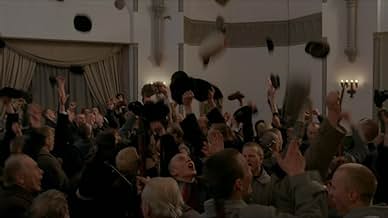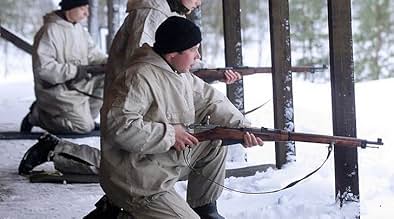Nimed marmortahvlil
- 2002
- 1h 35m
IMDb RATING
7.0/10
2.4K
YOUR RATING
This movie is about the Estonian War of Independence (1918-1920), specifically the students fighting on the nationalist side, but also shown the conflict between two ideologies (Estonian nat... Read allThis movie is about the Estonian War of Independence (1918-1920), specifically the students fighting on the nationalist side, but also shown the conflict between two ideologies (Estonian nationalism and communism).This movie is about the Estonian War of Independence (1918-1920), specifically the students fighting on the nationalist side, but also shown the conflict between two ideologies (Estonian nationalism and communism).
- Director
- Writers
- Stars
- Awards
- 1 nomination total
Hele Kõrve
- Marta
- (as Hele Kõre)
Bert Raudsep
- Käämer
- (as Bert Raudsepp)
- Director
- Writers
- All cast & crew
- Production, box office & more at IMDbPro
Featured reviews
The record-making, dazzling and thrilling Estonian blockbuster `Names in Marble' has brought nearly 150,000 people all over the country out of their comfortable homes to see something that takes your breath away.
The story evolves around a group of young schoolboys who decide to alter the course of history once and for all - to fight against the Soviet army and for the freedom of the new Republic of Estonia.
`Names in Marble' opens a doorway to a new dimension of Estonian cinema. Directed by Elmo Nüganen who is famous for his interpretation of many classical plays in several theatres in Estonia, the movie has a unique sense of closeness and significance that is not common for other Estonian movies. Nüganen adds another flavour to the picture by hiring the well-known Russian cameraman Sergei Astakhov to record the key scenes and arrange the almost perfect cinematography of the movie.
Another astonishment that the moviegoers might experience is the great work of some young and promising Estonian actors. The sincerity and clarity of the leading role, played by Priit Võigemast represents the possibilities and potential of Estonian cinema in reaching an international level.
It is unfortunate that the best yet Estonian movie has absolutely has no chance of getting a nomination for the `Best foreign film' Academy award - it lacks a certain multi-cultural perspective.
In the end it brought tears to the eyes, it did matter and it made us sit in the theatre until all the credits were shown and lights came on, reminding us how important it is to be who we are.
The story evolves around a group of young schoolboys who decide to alter the course of history once and for all - to fight against the Soviet army and for the freedom of the new Republic of Estonia.
`Names in Marble' opens a doorway to a new dimension of Estonian cinema. Directed by Elmo Nüganen who is famous for his interpretation of many classical plays in several theatres in Estonia, the movie has a unique sense of closeness and significance that is not common for other Estonian movies. Nüganen adds another flavour to the picture by hiring the well-known Russian cameraman Sergei Astakhov to record the key scenes and arrange the almost perfect cinematography of the movie.
Another astonishment that the moviegoers might experience is the great work of some young and promising Estonian actors. The sincerity and clarity of the leading role, played by Priit Võigemast represents the possibilities and potential of Estonian cinema in reaching an international level.
It is unfortunate that the best yet Estonian movie has absolutely has no chance of getting a nomination for the `Best foreign film' Academy award - it lacks a certain multi-cultural perspective.
In the end it brought tears to the eyes, it did matter and it made us sit in the theatre until all the credits were shown and lights came on, reminding us how important it is to be who we are.
A story of Estonian high school students who volunteer to defend their country from the Bolshevik invasion in 1918. The only reason to give this film 7 stars is the Estonian film industry context. For Estonia, this film is truly great. Not only it covers previously poorly presented (in the visual art) part of this country's history, it also is very well made camera work wise and the action scenes are done properly. But the director perhaps could have swapped some of the pathetic patriotism (obviously borrowed from the book the film is based on) for real-life attitude. I'll never believe that 17-year-old boys will be that desperately willing to sacrifice their lives and virtually act as if they long for the Red Army bullets. Natural human fear of death is what makes any war scene so much more realistic.
5Jan_
Ladies and gents, the most overrated Estonian movie of all times. Yes - it is at times warm and touching, it boasts splendid cinematography, it lacks the daft, aggressive jingoism painfully present in most patriotic flicks (read: American ones) and is not exaggerated like the aforementioned usually tend to be.
So "Names In Marble" is not a bad movie per se. Having said that, there are things that add up to a heavy reduction in its overall value.
I personally found it irritating how Elmo Nüganen had chosen to ignore Albert Kivikas' novel and write an insipid and even quite cheesy plot riddled with holes. Nüganen obviously failed to decide whether to make a pompous war epic or a minimal, realistic drama. So he chose both. I don't know what my fellow countrymen sought in the movie; I myself found the overdramatized battle scenes (rip-offs from Saving Private Ryan, mind you) to be painfully out of place. As well as the romantic sub-plot which didn't exist in the novel in the first place. But since action and/or romance are the things that mainly appeal to an average moviegoer, you'd simply _have_ to include both - and ruin excellent script material in the process. Quite sad.
The acting is OK, but just that. No, there is nothing tearjerking in this movie, sorry to say so. Yes, the subject matter is extremely personal to us Estonians, but I found the novel a thousand times more touching and thought-provoking than this "blockbuster". And if you think that this is the very defining moment in Estonian cinematography, think again.
Oh, well. Without further ado: if you're an Estonian or a non-Estonian pathologically fascinated with local culture, and haven't yet seen the movie - go and see it, although be warned: you haven't missed anything. Otherwise do this: look up Olli Saarela's "Rukajärven tie", a splendid recent addition to a fine series of Finnish war dramas ("Talvisota", "Tuntematon sotilas"). Because while "Names in Marble's" only significant value stems from its patriotic sting, "Rukajärven tie" is actually a cinematic achievement in the best sense of the term.
So "Names In Marble" is not a bad movie per se. Having said that, there are things that add up to a heavy reduction in its overall value.
I personally found it irritating how Elmo Nüganen had chosen to ignore Albert Kivikas' novel and write an insipid and even quite cheesy plot riddled with holes. Nüganen obviously failed to decide whether to make a pompous war epic or a minimal, realistic drama. So he chose both. I don't know what my fellow countrymen sought in the movie; I myself found the overdramatized battle scenes (rip-offs from Saving Private Ryan, mind you) to be painfully out of place. As well as the romantic sub-plot which didn't exist in the novel in the first place. But since action and/or romance are the things that mainly appeal to an average moviegoer, you'd simply _have_ to include both - and ruin excellent script material in the process. Quite sad.
The acting is OK, but just that. No, there is nothing tearjerking in this movie, sorry to say so. Yes, the subject matter is extremely personal to us Estonians, but I found the novel a thousand times more touching and thought-provoking than this "blockbuster". And if you think that this is the very defining moment in Estonian cinematography, think again.
Oh, well. Without further ado: if you're an Estonian or a non-Estonian pathologically fascinated with local culture, and haven't yet seen the movie - go and see it, although be warned: you haven't missed anything. Otherwise do this: look up Olli Saarela's "Rukajärven tie", a splendid recent addition to a fine series of Finnish war dramas ("Talvisota", "Tuntematon sotilas"). Because while "Names in Marble's" only significant value stems from its patriotic sting, "Rukajärven tie" is actually a cinematic achievement in the best sense of the term.
The movie is nice, if you want to give it a credit just because it is one of the rare chances to see Estonian cinema. It is touching and somewhat sentimental, though the director managed to avoid too cheesy holliwoodish scene. The main plus is the touching feeling it evokes when you think about those young lads who got in the civil war and have to fight the outnumbering enemy. There is a love story, beautiful girl, but nothing really happens. There is a token brother-against-brother theme, that is supposed to show the brutal nature of the civil war. There are battle scenes, but the main battle scene against Latvians is too over dramatized and extremely unrealistic. In general, it's OK if you don't start thinking how in reality those battles would be possible. If you start thinking it seems extremely surrealistic and devoid of any resemblance of what the battle would be in the real war. Thus, some 10 young students lying in the half trench seem to stop the whole company of mighty Latvian Reds (those guys hugely contributed to the victory of REds in Russia). The movie ends abruptly, and you have a feeling that something is missing. As for historical part, it's interesting that most Estonian/Finnish spectators immediately see it as us (Estonians) fighting them (Evil Russians). The movie itself doesn't really show much Russians. Most Reds are actually Estonian. Another thing is that the Civil war in Estonia (and Finland) is often presented as Liberation war, while in fact it was a Civil war. Russians played a minor role in both countries. And it was a part of one giant civil war going on in the whole disintegrating Russian empire with Reds fighting Whites. So the words appearing in the beginning of the movie and saying that Soviet Russia wanted to establish itself as a European power (implying that Soviet Russia invaded Estonia) have more to do with current Estonian political situation than with the history.
7jnk9
While many of us know the general outlines of World War I and of the fate of the Baltic republics up until their regained independence in the early 1990's, this movie is a valuable addition of flesh and blood to a complicated historic phase: the fight for the Estonian territory. Among the fighting parties: Estonians, "red" Soviet Russians, "white" Russians, Germans, Finns and Latvians. Add to this youthful idealism, a light romantic episode and lots of atmosphere and you will agree that it is well worth its 90 minutes.
The film is especially interesting to anyone with an interest in World War I, Soviet/Russian history or the Baltic region but just as much to anyone interested in more nuanced war/ action films.
The film is especially interesting to anyone with an interest in World War I, Soviet/Russian history or the Baltic region but just as much to anyone interested in more nuanced war/ action films.
Did you know
- GoofsThere's a surfaced road in one scene, but in Tartu in 1918 there were no tarmac roads.
- ConnectionsFeatured in Welcome to Estonia (2002)
Details
- Release date
- Countries of origin
- Official sites
- Languages
- Also known as
- Names Engraved in Marble
- Filming locations
- Production companies
- See more company credits at IMDbPro
Box office
- Budget
- EEK 24,000,000 (estimated)
- Gross worldwide
- $83,112
- Runtime
- 1h 35m(95 min)
- Color
- Sound mix
- Aspect ratio
- 1.85 : 1
Contribute to this page
Suggest an edit or add missing content





















